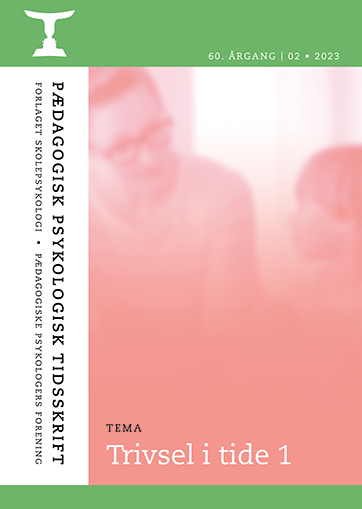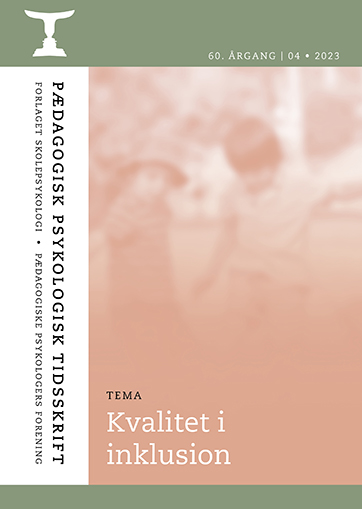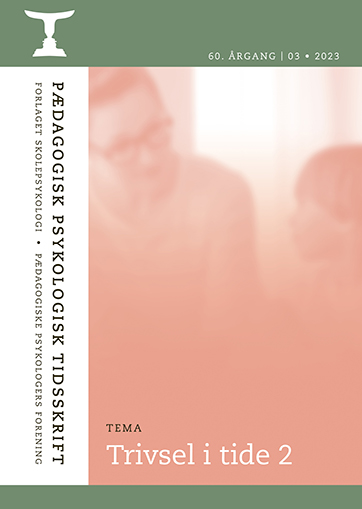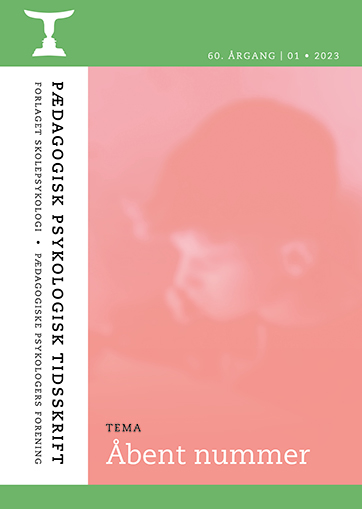Beskrivelse
Understandings of children’s well-being in and across daycare, school and home
By Mette Molbæk, Anette Boye Koch & Anne Marie Villumsen
A number of recent studies emphasise the importance of a focus on children’s well- being in Denmark. In this article and based on a systematic review of research in well-being, we present eight understandings of children’s well-being in and across daycare, school and home, as well as an analysis that shows that understandings of well-being vary according to context. The review’s empirical findings are subse- quently discussed in relation to Wilber’s integrative theory, which offers a common frame of reference in working with children’s well-being. Finally, we identify impli- cations in relation to the work with well-being, understandings of the contexts and collaboration on children’s well-being.
Well-being in legislation around children and young people – a black box that both softens and hardens
By Anne Mette Buus, Lotte Junker Harbo, Anne Søndberg, Anthon Sand Jørgensen & Marie Brejnrod
In this article, we ask how well-being is constructed in three different Danish legis- lations, all relevant to children and young people’s lives. We also ask how this con- struction somehow forms ideals and aims for the lives of children and young people and thereby for welfare professionals such as teachers, social workers and peda- gogues who encounter the children and young people on a daily basis. More specifi- cally, we carry out our Actor-Network Theory-based analysis on the Danish Dayca- re Act, the Danish Education Act and the Danish Children Act. Our analysis brings us to suggest that across the three Acts, well-being is being stabilised as both a strong actor and as an actor whose range and capability differ from Act to Act. Overall, we characterise well-being as a black box in these Acts, a black box that can both soften and harden the ideals and the endeavours of welfare professionals in their everyday practice with and around children and young people. In the last part of the article, we discuss how well-being as an ideal claim for welfare professio- nals can both emphasise the focus on a better life for children and young people while at the same time, it can carry a risk of challenging children, young people and welfare professionals who do not live up to the ideal.
Well-being in daycare during Covid-19 – Child sensitivity and smal groups
By Anette Boye Koch
The article considers child well-being in Danish early childhood education and care (ECEC) during the time of Covid-19. A phased reopening of Denmark took place in Spring 2020 under strict health guidelines. The study followed two ECEC institutions first-hand to observe the impact on pedagogy and child well-being. Participant observation and interviews were conducted, followed by re-interviews and an online survey a year later. Findings suggest that the pandemic allowed pedagogues to work with children in small, fixed groups and in a child-sensitive way that sup- ported child well-being. Implications for practice are that the increased external control did not negatively affect pedagogy or child well-being.
Can we have better meetings? – a project on inclusive forms of meetings
By Anette Boye Koch, Line Berg, Mette Molbæk & Camilla Armstrong Gjedde
The meeting is an important arena for collaboration and communication between families and professionals in order to support childhood well-being. The article describes a project that sought to develop new and different forms of meetings in which families are increasingly invited into an appreciative and involving meeting room. The project was inspired by design-based research and involved iterative experiments with new ways of meetings in an early childhood institution. Empirical data was collected and analysed on how to increase all families’ opportunities to participate as active and equal parts. Based on the project findings, we present a set of guidelines that address important themes and knowledge from research and practice. The purpose of the guidelines is to ensure both systematicity and flexi- bility in organising the collaboration with the families and to actively support the family’s involvement through a more flexible design of the meeting.
”… then we play that the diamonds are …” – About well-being and play culture in a prep-class
By Henriette Blomgren, Else Skibsted & Merete Munkholm
This article focuses attention on children’s well-being and play in a prep-class within the Danish compulsory school system. Through an analysis of a selected play scene taking place inside, the article investigates and discusses how well-being and play are closely connected, but as something more than simply being happy and playing well. Instead, the article analyses and exposes the different subtle strategies and intentions behind doing and belonging to the play. The study draws on notions of play from cultural perspectives and approaches well-being as a situated and complex
phenomenon connected to children’s engagement and desire to understand, belong and navigate within the specific play order. The study is part of a more extensive collaborative work undertaken in one school and involving three researchers. As a result of Covid-19 restrictions, the research design implies focused ethnography with short, intensified fieldwork and creating fieldnotes, video recordings, photos, drawings, and interviews with children.
Pedagogical work with well-being and children’s participation in play at school
By Hanne Hede Jørgensen
Children’s play participation is the pivot of this article because children themselves emphasise the importance of play in relation to their well-being. The article starts from a PhD project on play in schools and explores some of the challenges when so- called free play is on the pedagogical agenda in schools. The article’s contribution is to show how pedagogues who collaborate on and design play can promote the possi- bilities of participation for children and in doing so, enhance the general well-being. However, the article also shows that some children are excluded from participation when play is highlighted pedagogically.



